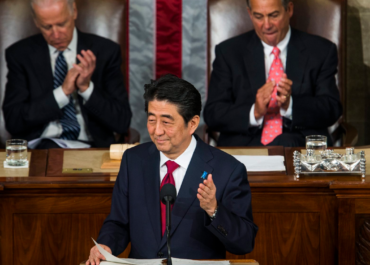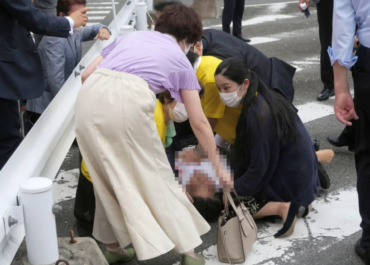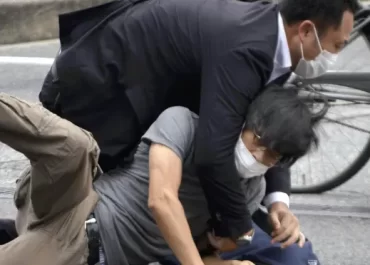- EU Trade Chief Maroš Šefčovič Urges MEPs to Support EU-US Trade Deal
- Paul Scholes names Arsenal star he would ‘love to play with’ despite criticism
- Hungary Accuses Ukraine of Lying, Vetoes in Tense Meeting This Week
- Tensions Rise Between France and US Ambassador Charles Kushner After No-Show
- Marcus Rashford makes Barcelona demand after talks over permanent Man Utd transfer
- Russia anticipated Kyiv’s capture within three days in 2022.
- Woman ‘driven to suicide by abusive partner’ left note saying she ‘couldn’t endure any longer’ | News UK
- Russia’s Territory Gains and Losses in Ukraine Over Four Years of War
Should Shinzo Abe have a state funeral?
- News Desk
- Asia, Crime, featured, Japan, Shinzo Abe, UK News briefing, World News
- 7.9
Quick Summary
- Shinzo Abe, Japan’s longest-serving prime minister, was shot dead two weeks ago, in a crime that shocked the globe
- His suspected shooter Yamagami Tetsuya, 41, has been arrested
- Shinzo stepped down in 2020 but remained hugely influential in politics
- The government want a state funeral to honour his legacy of leadership
- But opposition groups and politicians question the cost of such funeral and remind people that Abe was a divisive figure
- A recent poll suggested that 49 per cent were in support of a state funeral
- Gun and political violence is incredibly rare in Japan
Analysis
Should Shinzo Abe have a state funeral?
Shinzo Abe, Japan’s longest-serving prime minister, was shot dead two weeks ago, in a crime that shocked the globe.
Abe had stepped down from his role in 2020 and was making a speech when he was shot from behind.
Gun violence is rare in Japan.
Now, there is growing opposition over the plan to hold a state funeral for the former Japanese prime minister.
A state funeral would be the second of its kind for a former Japanese leader in the postwar era.
On Friday, the cabinet approved the state funeral arrangements for Shinzo Abe to take place on 27 September.
His shocking death has sparked a debate on how best to honour him – a popular and influential figure, but a politician who was also divisive.
Shinzo Abe – ‘outstanding leader’
He severed as PM for more than eight years over two terms and even though he stepped down in 2020, he remained an influential figure in the ruling Liberal Democratic Party.
Government officials argue in favour of a state funeral to be held at the Nippon Budokan in central Tokyo. They argue he was an outstanding leader who helped revive Japan’s economy, strengthen ties with the US and oversaw the reconstruction of the region destroyed by the March 2011 triple disaster.
…”he exerted leadership skills distinctive from others and bore heavy responsibility for dealing with several serious domestic and international issues”
“We made this decision … due to Abe’s record as the longest-serving prime minister, during which he exerted leadership skills distinctive from others and bore heavy responsibility for dealing with several serious domestic and international issues,” the chief cabinet secretary, Hirokazu Matsuno, said on Friday.
Matsuno said the event would be “non-denominational, simple and sombre”, adding that the estimated cost and number of attendees had yet to be decided.
Opposition question cost
But opposition groups and lawmakers questioned the use of taxpayers’ money for the funeral – guests are expected to include foreign leaders.
They further mention the public remains divided over Abe’s legacy. “It clearly violates freedom of thought and conscience protected under the constitution,” Mizuho Fukushima, who leads the opposition Social Democratic Party, told about 200 people protesting outside the prime minister’s office on Friday.
On Thursday, 50 people filed for an injunction with the Tokyo district court seeking to stop the use of public funds for a state funeral, saying such a funeral without parliamentary approval violated the constitutional right to freedom of belief.
Only 49% of people supported the state funeral plans for Abe, according to a recent NHK poll. Some have complained about the cost and the possibility that the event could be exploited to celebrate his brand of conservatism and his nationalist beliefs.
Shinzo Abe’s private funeral was held last week in Tokyo, large crowds had gathered and laid flowers in the street.
Abe Shinzo dead – what happened?
Japan’s former prime minister Shinzo Abe died after being shot while giving a speech in the city of Nara.
Abe, 67 bled to death after suffering two deep neck wounds that damaged an artery, said Dr Hidetada Fukushima from Nara Medical University Hospital.

He had no vital signs when he arrived at the hospital and was never revived after suffering major damage to his heart. He received more than 100 units of blood during four hours of blood transfusions as Mr Abe haemorrhaged.
The PM was shot from behind with a homemade gun – gun crime is a rarity in Japan and owning a gun is an extremely difficult thing to do due to their strict rules.
Abe’s assassination is the first of a sitting or former Japanese PM since the 1930s.
Mr Abe held his chest as he collapsed, footage shows his shirt covered in blood as security guards run towards him.
Shinzo Abe suspected shooter
Yamagami Tetsuya, 41, has been arrested.
He is seen in footage and pictures dressed in a grey t-shirt and beige trousers. He was wrestled to the ground by police officers.

It is believed he lives in Nara City and explosives have been found at his home.
Some reports are suggesting the suspect told officers he was unhappy with Abe’s politics and intended to kill him.
But Kyodo News said the man had not been motivated by a grudge against Mr Abe’s political beliefs.
The suspect reportedly served in the Japanese Navy.
He reportedly told police he had targeted Abe for his links with the Unification Church. He said his mother had made huge donations to the church two decades ago that left the family bankrupt.
Global reaction to Shinzo Abe death
Both political violence and gun violence are rare in Japan, in a nation of 125 million people there were only 10 gun-related crimes last year, including one death and four injuries. Of those 10, eight of them were gang-related.
“A barbaric act like this is absolutely unforgivable, no matter what the reasons are, and we condemn it strongly,” chief cabinet secretary Hirokazu Matsuno said.
Outgoing UK Prime Minister Boris Johnson said Mr Abe’s death was “incredibly sad news”.
EU Commission President Ursula von der Leyen said Mr Abe was a “wonderful person, great democrat and champion of the multilateral world order”.
Ukrainian President Volodymyr Zelenskyy said the “heinous act of violence has no excuse”.
I am shocked and saddened by the assassination of my friend and longtime partner Shinzo Abe in Japan. Former Prime Minister Abe was devoted to both the country he served and the extraordinary alliance between the United States and Japan.
— Barack Obama (@BarackObama) July 8, 2022
Former US President Barack Obama released a statement following the assassination of Shinzo Abe.
“I am shocked and saddened by the assassination of my friend and long-time partner Shinzo Abe in Japan.
“Former prime minister Abe was devoted to both the country he served and the extraordinary alliance between the United States and Japan.
“I will always remember the work we did to strengthen our alliance, the moving experience of travelling to Hiroshima and Pearl Harbor together, and the grace he and his wife Akie Abe showed to me and Michelle.
“Michelle and I send our deepest condolences to the people of Japan who are very much in our thoughts at this painful moment.”
Who is current Prime Minister of Japan?
Fumio Kishida
How old is Shinzo?
67 years (1954–2022)
Does Japan still have an emperor?
The current Emperor of Japan, Naruhito is the eldest son of former Emperor Akhito and his wife former Empress Michiko. Seen here at the opening of a session of Japan’s parliament in 2020, he has served as the official head of Japan’s imperial family since 2019.
Like this article?
News Desk
Leave a comment
Subscribe to Updates
Get the latest creative news from FooBar about art, design and business.

